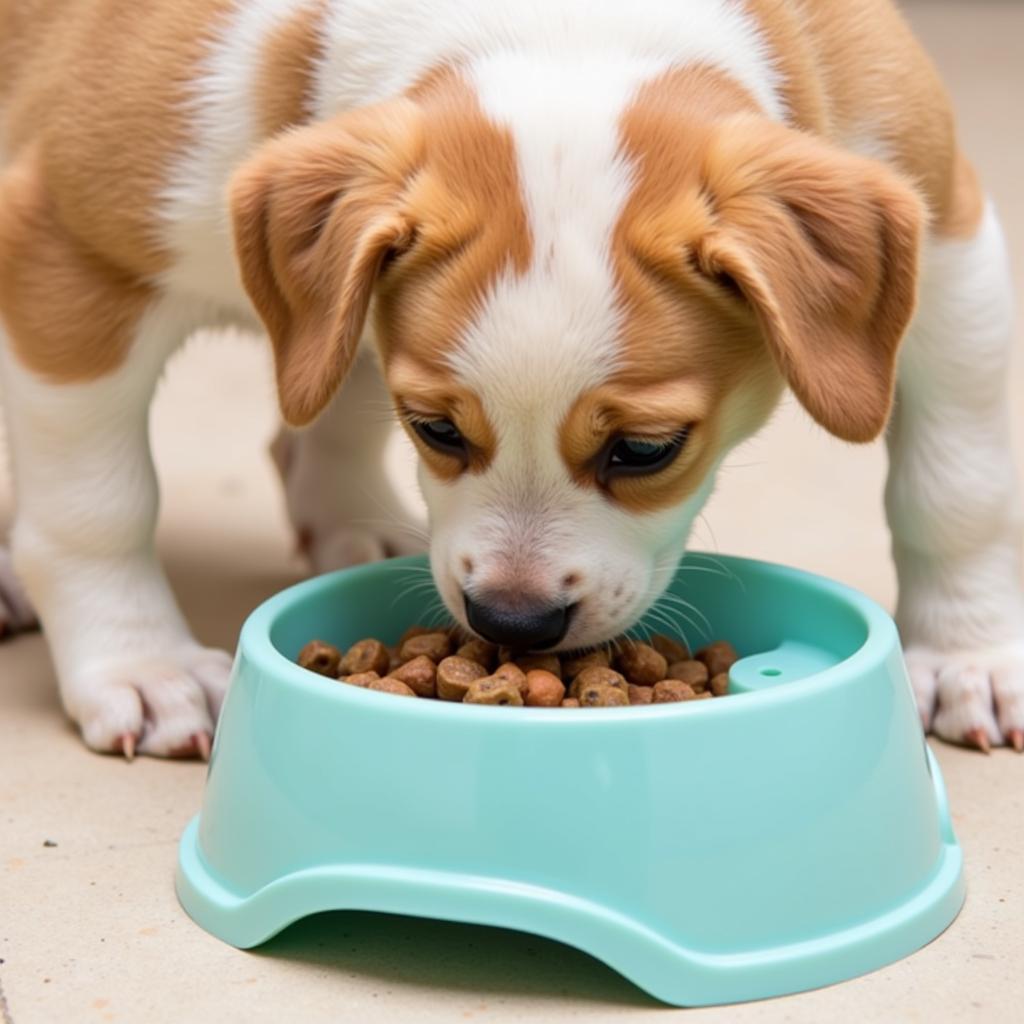If your puppy is vomiting undigested food, it’s naturally concerning. This can range from a simple upset stomach to a more serious underlying issue. This guide will help you understand the possible causes, when to seek veterinary attention, and how to support your puppy’s digestive health.
Why is My Puppy Throwing Up Undigested Food?
Several reasons can contribute to a Puppy Vomiting Undigested Food. One of the most common is eating too quickly. Puppies, in their enthusiasm, often gobble down their food without chewing properly. This can lead to the food being regurgitated shortly after eating, appearing largely undigested. Other potential causes include food allergies, dietary indiscretion (eating something they shouldn’t), infections, parasites, or even more serious conditions like blockages. It’s crucial to observe your puppy closely for any other accompanying symptoms.
Another factor to consider is the type of food you’re feeding your puppy. A sudden change in diet can upset their delicate digestive system. Even switching to a higher quality food can sometimes cause temporary digestive upset as their bodies adjust.
Changes in their routine, stress, or even certain medications can also contribute to vomiting. If your puppy has recently been vaccinated or dewormed, vomiting can be a side effect.
After welcoming a new puppy to your home, you might be thinking about getting them a tube of dog food. Just remember to monitor their intake to prevent overeating and potential vomiting.
Identifying the Severity: When to Worry
While an occasional episode of vomiting undigested food might not be cause for immediate alarm, certain signs warrant a trip to the veterinarian. If the vomiting is frequent, persistent, or accompanied by other symptoms like lethargy, diarrhea, blood in the vomit or stool, loss of appetite, or abdominal pain, seek professional help immediately. These could indicate a more serious underlying health issue.
Also, pay attention to the timing of the vomiting. If it consistently occurs shortly after eating, it could be related to eating habits or a food intolerance. Vomiting that happens hours after eating or on an empty stomach may suggest a different problem.
Supporting Your Puppy’s Digestive Health
There are several steps you can take to support your puppy’s digestive health and potentially prevent vomiting undigested food. First, consider feeding smaller, more frequent meals. This can help prevent them from overeating and overloading their digestive system.
Choosing a high-quality, easily digestible puppy food is also essential. Look for formulas specifically designed for puppies, with balanced nutrients and ingredients suitable for their developing digestive systems. Avoid sudden changes in diet and introduce new foods gradually.
Dr. Emily Carter, DVM, advises, “Slowing down a puppy’s eating can significantly reduce vomiting. Puzzle feeders or slow-feed bowls can be very effective.”
Make sure your puppy has access to fresh water at all times. Dehydration can exacerbate digestive issues. Also, avoid feeding table scraps or treats that are not specifically formulated for dogs. Many human foods are toxic to dogs and can cause vomiting and other health problems.
 Using a Slow Feed Bowl for Puppies
Using a Slow Feed Bowl for Puppies
Puppy Vomiting Undigested Food: What Food Should I Choose?
Selecting the right food for your puppy is crucial for their overall health, especially if they’re prone to vomiting. Consider a tube of dog food as a convenient and portion-controlled option.
Conclusion: A Healthy Puppy, A Happy Owner
Seeing your puppy vomit undigested food is understandably worrying. By understanding the potential causes, recognizing warning signs, and implementing strategies to support their digestive health, you can help ensure your puppy thrives. Remember to consult your veterinarian if the vomiting is frequent, persistent, or accompanied by other symptoms. With careful observation and proactive care, you can help your furry friend enjoy a healthy and happy life.
 Happy and Healthy Puppy Playing
Happy and Healthy Puppy Playing
FAQ
-
How often should a puppy vomit before I’m concerned? If your puppy vomits more than once in a 24-hour period or the vomiting persists, consult a vet.
-
Can stress cause vomiting in puppies? Yes, stress from changes in routine, travel, or new environments can upset a puppy’s stomach.
-
What are the signs of a food allergy in puppies? Besides vomiting, signs can include itching, skin problems, ear infections, and diarrhea.
Dr. Sarah Miller, DVM, adds, “Always consult your veterinarian for accurate diagnosis and treatment. Don’t rely solely on online information.”
Common Scenarios for Puppy Vomiting Undigested Food:
- Scenario 1: Puppy eats too quickly and vomits shortly after.
- Scenario 2: Puppy scavenges something from the trash and vomits.
- Scenario 3: Puppy has a food allergy and vomits after eating a certain protein.
Further Reading:
- Learn more about feeding options here: tube of dog food
Need Assistance?
For further support regarding your puppy’s health, please contact us: Phone: 02437655121, Email: minacones@gmail.com. You can also visit our office at 3PGH+8R9, ĐT70A, thôn Trung, Bắc Từ Liêm, Hà Nội, Việt Nam. We have a 24/7 customer service team ready to assist you.